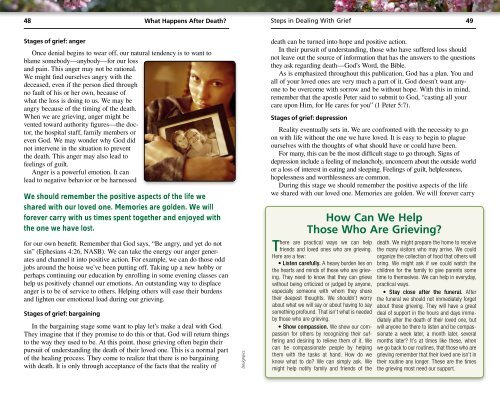what-happens-after-death
what-happens-after-death
what-happens-after-death
Create successful ePaper yourself
Turn your PDF publications into a flip-book with our unique Google optimized e-Paper software.
48 What Happens After Death? Steps in Dealing With Grief49Stages of grief: angerOnce denial begins to wear off, our natural tendency is to want toblame somebody—anybody—for our lossand pain. This anger may not be rational.We might find ourselves angry with thedeceased, even if the person died throughno fault of his or her own, because of<strong>what</strong> the loss is doing to us. We may beangry because of the timing of the <strong>death</strong>.When we are grieving, anger might bevented toward authority figures—the doctor,the hospital staff, family members oreven God. We may wonder why God didnot intervene in the situation to preventthe <strong>death</strong>. This anger may also lead tofeelings of guilt.Anger is a powerful emotion. It canlead to negative behavior or be harnessedWe should remember the positive aspects of the life weshared with our loved one. Memories are golden. We willforever carry with us times spent together and enjoyed withthe one we have lost.for our own benefit. Remember that God says, “Be angry, and yet do notsin” (Ephesians 4:26, NASB). We can take the energy our anger generatesand channel it into positive action. For example, we can do those oddjobs around the house we’ve been putting off. Taking up a new hobby orperhaps continuing our education by enrolling in some evening classes canhelp us positively channel our emotions. An outstanding way to displaceanger is to be of service to others. Helping others will ease their burdensand lighten our emotional load during our grieving.Stages of grief: bargainingIn the bargaining stage some want to play let’s make a deal with God.They imagine that if they promise to do this or that, God will return thingsto the way they used to be. At this point, those grieving often begin theirpursuit of understanding the <strong>death</strong> of their loved one. This is a normal partof the healing process. They come to realize that there is no bargainingwith <strong>death</strong>. It is only through acceptance of the facts that the reality ofDesignpics<strong>death</strong> can be turned into hope and positive action.In their pursuit of understanding, those who have suffered loss shouldnot leave out the source of information that has the answers to the questionsthey ask regarding <strong>death</strong>—God’s Word, the Bible.As is emphasized throughout this publication, God has a plan. You andall of your loved ones are very much a part of it. God doesn’t want anyoneto be overcome with sorrow and be without hope. With this in mind,remember that the apostle Peter said to submit to God, “casting all yourcare upon Him, for He cares for you” (1 Peter 5:7).Stages of grief: depressionReality eventually sets in. We are confronted with the necessity to goon with life without the one we have loved. It is easy to begin to plagueourselves with the thoughts of <strong>what</strong> should have or could have been.For many, this can be the most difficult stage to go through. Signs ofdepression include a feeling of melancholy, unconcern about the outside worldor a loss of interest in eating and sleeping. Feelings of guilt, helplessness,hopelessness and worthlessness are common.During this stage we should remember the positive aspects of the lifewe shared with our loved one. Memories are golden. We will forever carryHow Can We HelpThose Who Are Grieving?There are practical ways we can helpfriends and loved ones who are grieving.Here are a few:• Listen carefully. A heavy burden lies onthe hearts and minds of those who are grieving.They need to know that they can grievewithout being criticized or judged by anyone,especially someone with whom they sharetheir deepest thoughts. We shouldn’t worryabout <strong>what</strong> we will say or about having to saysomething profound. That isn’t <strong>what</strong> is neededby those who are grieving.• Show compassion. We show our compassionfor others by recognizing their sufferingand desiring to relieve them of it. Wecan be compassionate people by helpingthem with the tasks at hand. How do weknow <strong>what</strong> to do? We can simply ask. Wemight help notify family and friends of the<strong>death</strong>. We might prepare the home to receivethe many visitors who may arrive. We couldorganize the collection of food that others willbring. We might ask if we could watch thechildren for the family to give parents sometime to themselves. We can help in everyday,practical ways.• Stay close <strong>after</strong> the funeral. Afterthe funeral we should not immediately forgetabout those grieving. They will have a greatdeal of support in the hours and days immediately<strong>after</strong> the <strong>death</strong> of their loved one, butwill anyone be there to listen and be compassionatea week later, a month later, severalmonths later? It’s at times like these, whenwe go back to our routines, that those who aregrieving remember that their loved one isn’t intheir routine any longer. These are the timesthe grieving most need our support.


